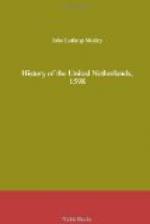Eight millions a year were estimated as the revenue from the eight kingdoms incorporated under the general name of Castile, while not more than six hundred thousand came from the three kingdoms which constituted Arragon. The chief sources of money receipts were a tax of ten per cent. upon sales, paid by the seller, called Alcavala, and the Almoxarifalgo or tariff upon both imports and exports. Besides these imposts he obtained about eight hundred thousand dollars a year by selling to his subjects the privilege of eating eggs upon fast-days, according to the permission granted him by the pope, in the bull called the Cruzada. He received another annual million from the Sussidio and the Excusado. The first was a permission originally given by the popes to levy six hundred thousand dollars a year upon ecclesiastical property for equipment of a hundred war-galleys against the Saracens, but which had more recently established itself as a regular tax to pay for naval hostilities against Dutch and English heretics—a still more malignant species of unbelievers in the orthodox eyes of the period. The Excusado was the right accorded to the king always to select from the Church possessions a single benefice and to appropriate its fruit—a levy commuted generally for four hundred thousand dollars a year. Besides these regular sources of income, large but irregular amounts of money were picked up by his Majesty in small sums, through monks sent about the country simply as beggars, under no special license, to collect alms from rich and poor for sustaining the war against the infidels of England and Holland. A certain Jesuit, father Sicily by name, had been industrious enough at one period in preaching this crusade to accumulate more than a million and a half, so that a facetious courtier advised his sovereign to style himself thenceforth king, not of the two, but of the three Sicilies, in honour of the industrious priest.
It is worthy of remark that at different periods during Philip’s reign, and especially towards its close, the whole of his regular revenue was pledged to pay the interest, on his debts, save only the Sussidio and the Cruzada. Thus the master of the greatest empire of the earth had at times no income at his disposal except the alma he could solicit from his poorest subjects to maintain his warfare against foreign miscreants, the levy on the Church for war-galleys; and the proceeds of his permission to eat meat on Fridays. This sounds like an epigram, but it is a plain, incontestable fact.
Thus the revenues of his foreign dominions being nearly consumed by their necessary expenses, the measure of his positive wealth was to be found in the riches of Spain. But Spain at that day was not an opulent country. It was impossible that it should be rich, for nearly every law, according to which the prosperity of a country becomes progressive; was habitually violated. It is difficult to state even by approximation the amount of its population, but the kingdoms united under the crown of Castile were estimated by contemporaries to contain eight millions, while the kingdom of Portugal, together with those annexed to Arragon and the other provinces of the realm, must have numbered half as many. Here was a populous nation in a favoured land, but the foundation of all wealth was sapped by a perverted moral sentiment.




